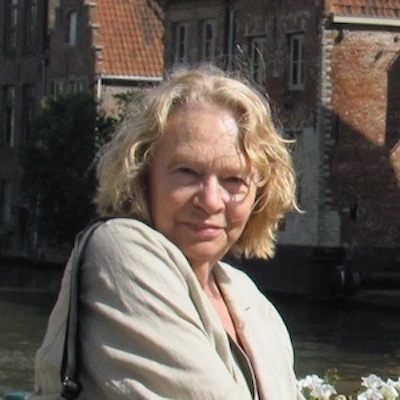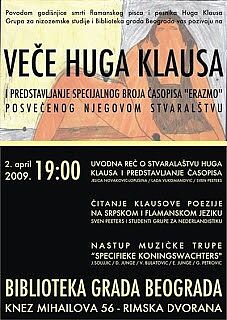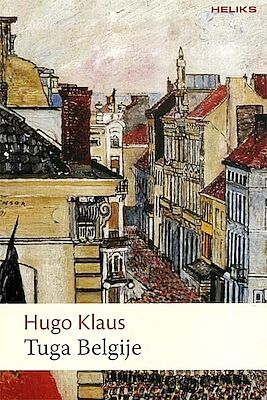Hugo Claus: The Most Translated Author from the Low Countries in Serbia
Hugo Claus is regarded as one of the most important and versatile Flemish authors in the post-war era. His work has been translated into 32 languages, according to the data available in the database of the Dutch Foundation for Literature. He is largely translated into French, with more than 60 publications, followed by the other so-called central languages, German, and English, with over 20 publications each. Finally, he has been translated into Polish, Spanish, and Swedish more than 15 times. In other, mostly peripheral languages, Claus is represented by an average of three translations. Surprisingly, among those other languages, the Serbian language stands out with 15 publications. How did Claus become the most translated author in Serbia?
Everything begins with the translator
Hugo Claus was introduced to the Serbian readership for the first time in the anthology of New Flemish Short Stories compiled by renowned Serbian writer, translator, and lexicographer Dragoslav Andrić in 1972. Andrić translated his short story "Gebed om Geweld" from the collection The Black Emperor (De zwarte keizer) from 1958. It took twenty years for the following translations to appear. Translations of the short story "Een bijzondere cirkel" and the theatrical peace A Bride in the Morning (Een bruid in de morgen) debuted in the newly founded Magazine of Dutch and Flemish Literature in Translation – Erazmo in 1992. The second one was published three years later, in 1996, in book form as a part of the book series on Dutch and Flemish Literature by the publishing house Prometej. As a matter of fact, the readers in Serbia were also first introduced to the fragments from Claus’ magnum opus, The Sorrow of Belgium (Het verdriet van België) in Erazmo in 1993, while the integral translation appeared in the aforementioned book series in 2000.

Ivana Šćepanović, the most productive translator from Dutch in Serbia.
A total of 10 books by Hugo Claus were translated into Serbian. The first was his debut novel, The Duck Hunt (De Metsiers), which was released in 1995 in Serbian translation by the publisher Prometej. The most recent one, The Cool Lover (De koele minaar), was brought out in 2012 by the publishing house Arhipelag. The book series of Dutch and Flemish Literature included no fewer than seven translations. Apart from that, the translation of the novel The Swordfish (De zwaardvis) was published by Matica srpska in cooperation with the publishers Cicero and Pismo, while his autobiographical novel The Year of the Cancer (Het jaar van de kreeft) was brought out by the largest Serbian publisher, Laguna, in 2010. Except for the novel The Swordfish, translated by Jelica Novaković-Lopušina, all the translations were done by Ivana Šćepanović who was also the editor of Prometej’s book series Dutch and Flemish Literature.
That leads us back to our initial question regarding why Claus is the most translated author in Serbia. Ivana Šćepanović (b. 1934) was one of the first students at the newly established Lectorate for the Dutch Language at the Faculty of Philology in Belgrade. She was awarded a scholarship to attend the summer school of the Dutch Language in Flanders, where she discovered Flemish literature, and particularly the work of Hugo Claus, who quickly became her favourite author. This fascination led her to translate ten of his novels, short stories and plays. Once she became the editor at Prometej, she used the opportunity to publish them as well.
In the silence of convenient indifference

Poster for an evening dedicated to Hugo Claus, organized by the Department for Dutch Studies in Belgrade in 2009.
Even though Claus is widely translated in Serbia, most of those translations failed to capture the attention of the broader public in Serbia. Their reception was initially limited to a small circle of connoisseurs. Five publications included an afterword written by the Flemish literary critic, Marcel Janssens, thanks to the translator's personal ties. Apart from that, there have been no further reviews or studies of his work published in Serbia to our knowledge.
Even the first issue of Claus’ most famous novel, The Sorrow of Belgium, from 2000 published by Prometej ended up "in the silence of convenient indifference", as noted by renowned Serbian literary critic Teofil Pančić in his review of the reissue of this book. However, since 2010, there has been a minor shift in reception. The largest publishing company in Serbia, Laguna, took an interest in his work and brought out the translation of his novel The Year of the Cancer in 2010. Two years later, in 2012, an esteemed publisher, Arhipelag, issued a translation of his 1956 novel, The Cool Lover. Apart from that, in 2013 the publishing company Heliks from Smedervo reissued the translation of The Sorrow of Belgium previously published by Prometej. In the same year, following the publication of this book, the Serbian Association of Literary Translators had a panel discussion titled "Hugo Claus: A Classic of Modern European Literature". On that occasion, Gojko Božović, founder and chief editor of Arhipelag, and Ivana Šćepanović discussed the position of Hugo Claus in the European literary field as well as his versatility as an artist.
Furthermore, Serbian translator, philosopher, and literary critic, Ivan Milenković, refers to Hugo Claus in his review of the trilogy, Brändövägen 8, Bävervägen 11 and Mariegatan 26 by Finland-Swedisch author Hendrik Tikannen. He compares the way the two authors write about their home countries and their elite. Furthermore, in an interview for the Serbian literary portal Black Sheep, Serbian writer Zoran Penevski mentions The Sorrow of Belgium as one of his favorite books and recommends it to the readers.
A second chance

Cover of the reprinted edition of Het verdriet van België, Arhipelag Publishing, 2013.
As previously stated, Arhipelag Publishing acquired the rights from Prometej and reprinted a revised translation of The Sorrow of Belgium in 2013. Originally published in two volumes in 2000, the first titled The Sorrow and the second one titled Of Belgium, Arhipelag published it as a single volume. Marcel Janssen, a Flemish critic, wrote two separate afterwords for each edition. The reprinted edition includes those afterwords as well, however with some changes. For instance, the paragraph that refers to the Serbian translation and the challenges the translator, Ivana Šćepanović, had to face when dealing with culture specific aspects of the books and the dialects is not included in the reprinted version. As well as the parts where Janssens writes about the Claus’ ambivalence towards the land of his father and the language of his mother and his opus as a screenwriter.
In 2014, in the esteemed weekly magazine Vreme appeared a highly favorable review of the book by one of the leading literary critics, Teofil Pančić, titled "A Masterpiece from an Impossible Country". Throughout his analysis of the book, Pančić praises the authors' literary craftsmanship. Pančić claims that Claus' every sentence is "damn literary amazing", that his book is the one to ‘admire’ rather than appreciate and that "one page of this book will be worth more than whole (good) novels that you may come across". He also laments the destiny of the so-called "small literatures", which is bound to "remain in the ghetto" for the study of connoisseurs and students of exotic departments. Furthermore, he says that Claus’ masterpiece would, more of less, occupy the same place in our "general culture" as, let's say, The Name of the Rose, One Hundred Years of Solitude, The Tin Drum and the likes had Claus won the Nobel Prize for Literature (which he didn't).
As we can see in the example of Hugo Claus, just because an author’s work had been widely translated does not necessarily indicate that it has been widely read. The translator’s admiration and personal contacts resulted in a significant volume of translations. The publisher, on the other hand, did little to promote and disseminate the books. Claus was only able to break through "the stillness of convenient indifference" when the two larger publishers with a greater focus on belles-lettres became interested in his work.
(Bojana Budimir)
